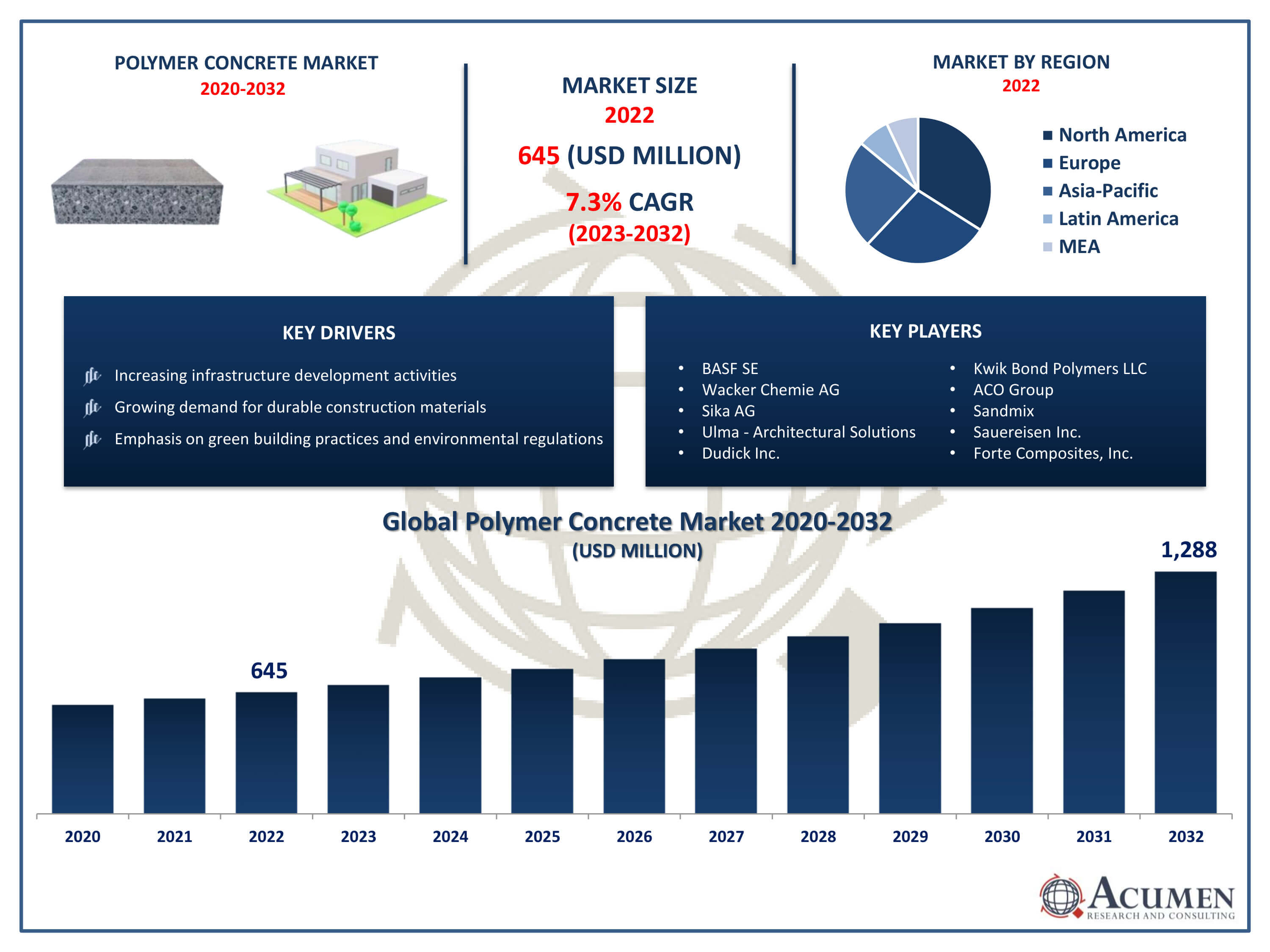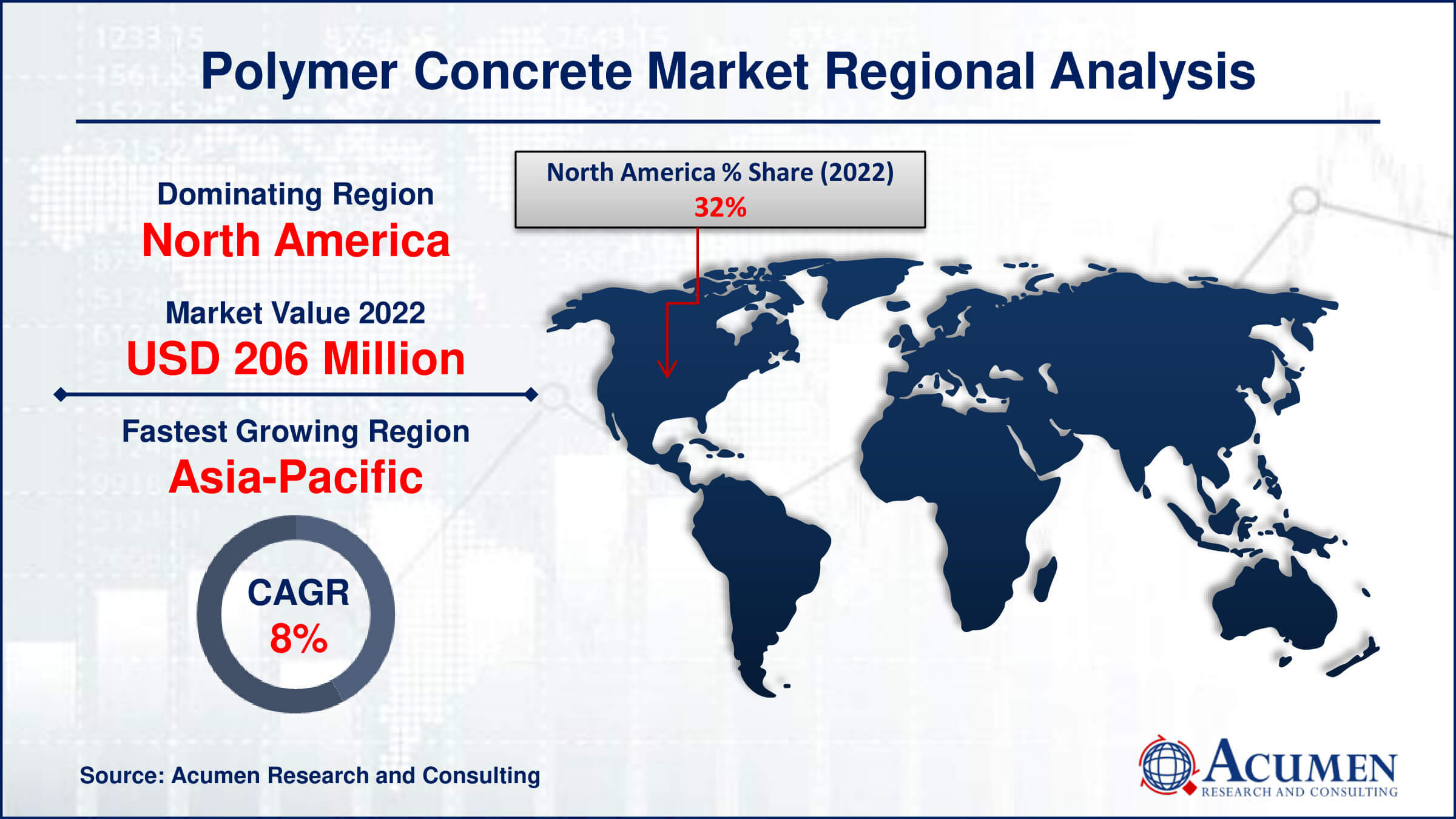Polymer Concrete Market Size - Global Industry, Share, Analysis, Trends and Forecast 2023 - 2032
Published :
Report ID:
Pages :
Format :
Polymer Concrete Market Size - Global Industry, Share, Analysis, Trends and Forecast 2023 - 2032
Report Coverage
- Industry Dynamics
- Market Size and Forecast Data
- Segment Analysis
- Competitive Landscape
- Regional Analysis with a Niche Focus on Country-Level Data
- High Level Analysis - Porter's, PESTEL, Value Chain, etc.
- Company Profiles of Key Players
- Option to Customize the Report As Per Your Specific Need
Request Sample Report
The Polymer Concrete Market Size accounted for USD 645 Million in 2022 and is projected to achieve a market size of USD 1,288 Million by 2032 growing at a CAGR of 7.3% from 2023 to 2032.
Polymer Concrete Market Highlights
- Global polymer concrete market revenue is expected to increase by USD 1,288 Million by 2032, with a7.3% CAGR from 2023 to 2032
- North America region led with more than 32% of polymer concrete market share in 2022
- Asia-Pacific polymer concrete market growth will record a CAGR of more than 8.1% from 2023 to 2032
- By material type, the polyester segment captured more than 28% of revenue share in 2022.
- By application, the solid surface countertops segment is projected to expand at the fastest CAGR over the projected period
- Growing demand for durable construction materials, drives the polymer concrete market value

Polymer concrete is a type of concrete that is reinforced with a polymer, typically a resin, instead of traditional cement as the binding agent. This results in a material that exhibits enhanced strength, durability, and resistance to chemicals and abrasion compared to conventional concrete. The polymer resin fills the voids between aggregate particles, creating a dense matrix that improves the overall performance of the concrete.
The market for polymer concrete has been witnessing significant growth in recent years, driven by various factors such as increasing infrastructure development activities, growing demand for durable construction materials, and rising awareness about the benefits of polymer concrete over conventional options. Moreover, the expanding applications of polymer concrete in industries such as transportation, construction, industrial tanks, and wastewater management further contribute to its market growth. Additionally, advancements in polymer technology, leading to the development of high-performance polymers tailored for specific applications, are expected to fuel the market expansion further.
Global Polymer Concrete Market Trends
Market Drivers
- Increasing infrastructure development activities
- Growing demand for durable construction materials
- Expanding applications in transportation, industrial tanks, and wastewater management
- Advancements in polymer technology
- Emphasis on green building practices and environmental regulations
Market Restraints
- High initial costs compared to conventional concrete
- Limited awareness and adoption in some regions
Market Opportunities
- Rising investment in sustainable infrastructure projects
- Development of innovative polymer formulations for specialized applications
Polymer Concrete Market Report Coverage
| Market | Polymer Concrete Market |
| Polymer Concrete Market Size 2022 | USD 645 Million |
| Polymer Concrete Market Forecast 2032 |
USD 1,288 Million |
| Polymer Concrete Market CAGR During 2023 - 2032 | 7.3% |
| Polymer Concrete Market Analysis Period | 2020 - 2032 |
| Polymer Concrete Market Base Year |
2022 |
| Polymer Concrete Market Forecast Data | 2023 - 2032 |
| Segments Covered | By Material Type, By Binding Agent, By Application, And By Geography |
| Regional Scope | North America, Europe, Asia Pacific, Latin America, and Middle East & Africa |
| Key Companies Profiled | BASF SE, Wacker Chemie AG, Sika AG, Ulma - Architectural Solutions, Dudick Inc., Kwik Bond Polymers LLC, ACO Group, Sandmix, Sauereisen Inc., Forte Composites, Inc., and Hubbell Power Systems Inc. |
| Report Coverage |
Market Trends, Drivers, Restraints, Competitive Analysis, Player Profiling, Covid-19 Analysis, Regulation Analysis |
Polymer concrete is a type of concrete that incorporates polymer resin as a binding agent instead of traditional cement. This results in a material with enhanced properties such as increased strength, durability, chemical resistance, and reduced permeability. Polymer concrete typically consists of a mixture of aggregate (such as sand, gravel, or crushed stone), polymer resin, and additives. The polymer resin fills the voids between the aggregate particles, creating a dense matrix that improves the overall performance of the concrete. The applications of polymer concrete are diverse and growing rapidly. One major application is in infrastructure projects such as bridges, roads, and tunnels, where its superior durability and resistance to harsh environmental conditions make it an ideal choice. In the construction industry, polymer concrete is also used for industrial flooring, precast elements, and building facades due to its high strength and aesthetic appeal. Moreover, polymer concrete finds extensive use in chemical processing facilities, sewage treatment plants, and marine structures where its resistance to corrosive chemicals and saltwater offers significant advantages over conventional concrete.
The polymer concrete market has been experiencing robust growth in recent years, driven by several factors. One of the primary drivers is the increasing demand for durable and high-performance construction materials. Polymer concrete offers superior strength, durability, and resistance to chemicals and abrasion compared to traditional concrete, making it particularly attractive for infrastructure projects, industrial applications, and harsh environments. As a result, there has been a growing preference for polymer concrete in sectors such as transportation, wastewater management, and industrial flooring, fueling market expansion. Furthermore, the escalating investment in infrastructure development worldwide has been a significant catalyst for the growth of the polymer concrete market. Governments and private entities are investing in various infrastructure projects, including roads, bridges, airports, and utilities, which require materials with enhanced durability and longevity. Polymer concrete's ability to withstand heavy traffic loads, harsh weather conditions, and chemical exposure makes it an ideal choice for such projects.
Polymer Concrete Market Segmentation
The global polymer concrete market segmentation is based on material type, binding agent, application, and geography.
Polymer Concrete Market By Material Type
- Polyester
- Epoxy Based
- Vinyl Ester
- Others
According to the polymer concrete industry analysis, the polyester segment accounted for the largest market share in 2022. Polyester resins are widely utilized in polymer concrete formulations due to their excellent mechanical properties, such as high tensile strength and resistance to corrosion and chemical attack. These characteristics make polyester polymer concrete particularly suitable for applications in harsh environments, such as industrial flooring, containment structures, and chemical processing facilities. As industries increasingly prioritize durability and longevity in construction materials, the demand for polyester-based polymer concrete solutions has surged. Moreover, advancements in polyester resin technology have contributed to the growth of this segment. Manufacturers have been focusing on developing improved formulations with enhanced performance characteristics, including greater flexural strength, faster curing times, and improved adhesion properties.
Polymer Concrete Market By Binding Agent
- Natural Resin
- Synthetic Resin
In terms of binding agents, the synthetic resin segment is expected to witness significant growth in the coming years. Synthetic resins, such as epoxy, vinyl ester, and phenolic resins, offer exceptional mechanical properties, chemical resistance, and adhesion, making them highly desirable for a wide range of applications in construction. Epoxy resin, in particular, has emerged as a popular choice due to its excellent bonding strength, low shrinkage, and rapid curing properties. As industries seek durable and high-performance construction materials for infrastructure projects, the demand for synthetic resin-based polymer concrete solutions has surged, driving market growth. Furthermore, advancements in synthetic resin technology have fueled the expansion of this segment. Manufacturers have been investing in research and development to innovate new resin formulations with enhanced properties, such as increased flexibility, improved resistance to temperature extremes, and reduced environmental impact.
Polymer Concrete Market By Application
- Solid Surface Countertops
- Waste Containers
- Outdoor Seats & Benches
- Trench Drains
- Pump Bases
- Chemical Containments
- Flooring Blocks
- Others
According to the polymer concrete market forecast, the solid surface countertops segment is expected to witness significant growth in the coming years. Solid surface countertops made from polymer concrete offer a range of advantages over traditional materials such as natural stone or laminate, including exceptional durability, resistance to stains, scratches, and heat, as well as a non-porous surface that is easy to clean and maintain. These features have made polymer concrete countertops increasingly popular in residential, commercial, and industrial settings, driving demand within this segment. Moreover, advancements in polymer concrete technology have contributed to the growth of solid surface countertops in the market. Manufacturers have been able to innovate new formulations that offer improved aesthetics, such as a wider range of colors, patterns, and textures, while maintaining the durability and performance characteristics that make polymer concrete countertops desirable. Additionally, technological advancements in manufacturing processes have led to increased production efficiency, allowing for cost-effective fabrication of solid surface countertops, further fueling market growth.
Polymer Concrete Market Regional Outlook
North America
- U.S.
- Canada
Europe
- U.K.
- Germany
- France
- Spain
- Rest of Europe
Asia-Pacific
- India
- Japan
- China
- Australia
- South Korea
- Rest of Asia-Pacific
Latin America
- Brazil
- Mexico
- Rest of Latin America
The Middle East & Africa
- South Africa
- GCC Countries
- Rest of the Middle East & Africa (ME&A)

Polymer Concrete Market Regional Analysis
North America has emerged as a dominating region in the polymer concrete market due to several key factors that contribute to its strong market presence. One significant factor is the region's robust infrastructure development activities, driven by growing urbanization, population expansion, and the need to upgrade aging infrastructure. These factors create substantial demand for durable construction materials like polymer concrete, which offers superior performance and longevity compared to traditional concrete, especially in harsh environmental conditions and high-traffic areas. Furthermore, North America benefits from advanced technological capabilities and a well-established industrial base, facilitating the development and production of high-quality polymer concrete products. The region is home to numerous leading manufacturers and suppliers of polymer concrete, offering a wide range of innovative solutions tailored to diverse applications. Additionally, stringent regulatory standards and quality requirements in North America ensure that polymer concrete products meet rigorous performance and safety standards, enhancing their market competitiveness and reliability. Moreover, increasing awareness among consumers and industries about the benefits of polymer concrete, such as its resistance to corrosion, chemicals, and abrasion, further drives market growth in North America.
Polymer Concrete Market Player
Some of the top polymer concrete market companies offered in the professional report include BASF SE, Wacker Chemie AG, Sika AG, Ulma - Architectural Solutions, Dudick Inc., Kwik Bond Polymers LLC, ACO Group, Sandmix, Sauereisen Inc., Forte Composites, Inc., and Hubbell Power Systems Inc.
Frequently Asked Questions
How big is the polymer concrete market?
The polymer concrete market size was USD 645 Million in 2022.
What is the CAGR of the global polymer concrete market from 2023 to 2032?
The CAGR of polymer concrete is 7.3% during the analysis period of 2023 to 2032.
Which are the key players in the polymer concrete market?
The key players operating in the global market are including BASF SE, Wacker Chemie AG, Sika AG, Ulma - Architectural Solutions, Dudick Inc., Kwik Bond Polymers LLC, ACO Group, Sandmix, Sauereisen Inc., Forte Composites, Inc., and Hubbell Power Systems Inc.
Which region dominated the global polymer concrete market share?
North America held the dominating position in polymer concrete industry during the analysis period of 2023 to 2032.
Which region registered fastest CAGR from 2023 to 2032?
Asia-Pacific region exhibited fastest growing CAGR for market of polymer concrete during the analysis period of 2023 to 2032.
What are the current trends and dynamics in the global polymer concrete industry?
The current trends and dynamics in the polymer concrete industry include increasing infrastructure development activities, growing demand for durable construction materials, and expanding applications in transportation, industrial tanks, and wastewater management.
Which binding agent held the maximum share in 2022?
The synthetic resin binding agent held the maximum share of the polymer concrete industry.


